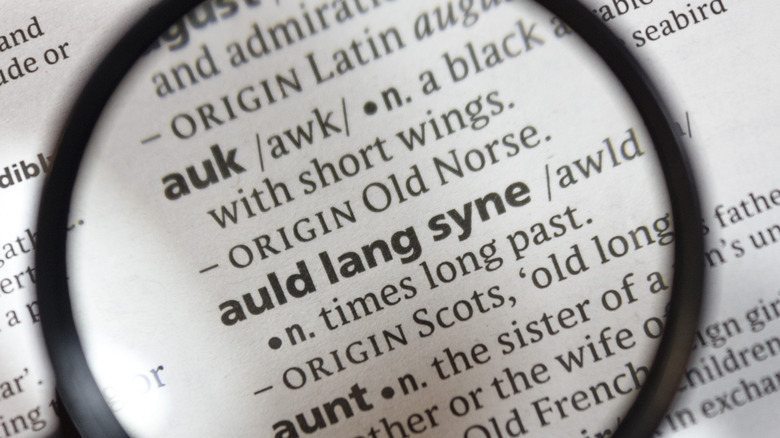The History Of Auld Lang Syne Explained
While you might not be able to sing it or even know any of the words to it, this very familiar song is heard the minute the clock strikes midnight on January 1. Every year, during the first few minutes or so of the New Year, the song "Auld Lang Syne" is traditionally sung in a lot of countries. A lot of people hum it and definitely know the harmony of the song. Others might even get out "Should auld (old) acquaintance be forgot" — a commonly sung and referenced lyric from the song.
Despite the song's title and some of its lyrics not being in English, some of them are understood by English speakers, and "Auld Lang Syne" is typically played in English-speaking countries. But where does this song come from, and why do people play and sing it on New Year's day? If you've ever wondered where the song originates, you can thank the Scottish, as the song has its roots in Scotland (via Britannica).
The history of Auld Lang Syne as a New Year tradition
Scots is a language mostly spoken in Scotland, and the song title "Auld Lang Syne" is in Scots. In the late 18th century, a Scotsman named Robert Burns wrote a poem that he first titled with the famous song name, says Britannica. The literal English translation of the song means "old long since." It then became a song in 1799 when Scottish composer George Thomson compiled the lyrics and musical notes of what is known as "Auld Lang Syne."
But Burns didn't coin the term. The Scottish were making mention of "auld lang syne long" before his poem, per Reader's Digest. However, it wouldn't become a popular New Year's song until the 20th century. In 1929, a Canadian bandleader named Guy Lombardo would change the history of the famous Scots saying forever.
Lombardo and his Royal Canadians band performed the song for the first time on radio broadcast on New Year's Eve in 1929. He led this tradition for decades, even going from radio to television. He played out of a New York restaurant first and then landed at the famous Waldorf-Astoria Hotel in 1954, which popularized "Auld Lang Syne" as a New Year's song (via another Britannica link). As a result, the song quickly became associated with New Year's. Lombardo even earned himself the nickname "Mr. New Year's Eve." He died in 1977, but the tradition carried on (via The Washington Post).

